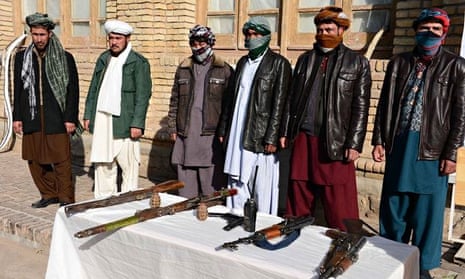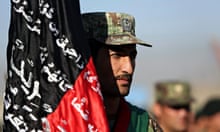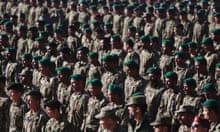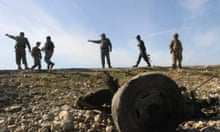In an apparent nod to much improved ties between Washington and Kabul, US forces fighting in Afghanistan will have extra powers next year to target Taliban fighters and protect the fragile government of new president Ashraf Ghani.
An order from Barack Obama allows American troops to attack insurgents who are threatening their safety or that of Afghan officials, the New York Times and Associated Press have reported. A much narrower mission laid out this spring only allowed US soldiers to train their Afghan counterparts, and fight militants from al-Qaida or other international groups.
Since then the Afghan army has taken a brutal hammering, civilian casualties have escalated and the country has harvested a record opium crop, while the advance of Islamic State (Isis) in Iraq has thrown into stark relief the risks of leaving weak national security forces to fight a brutal, battle-hardened insurgency.
The new order will not give US commanders on the ground more troops, more time, or leave to launch operations against the Taliban unilaterally. But it means they will have more room to support a president who has been publicly grateful for Nato’s assistance and privately asked for more aid.
“This [broader mission] is something that has no doubt been discussed for some time among military actors. But it is now politically possible because of a request from the government of Afghanistan,” said Michael Keating, senior consulting fellow at Chatham House and former deputy head of the UN mission in Afghanistan.
It was a request that would have been impossible under Ghani’s predecessor Hamid Karzai, who became an outspoken critic of the American military mission over the course of 13 years in power, once warning Washington its troops risked being seen as occupiers.
Angered by thousands of civilian deaths, Karzai eventually banned all air strikes and special forces raids, including banning his own troops from requesting Nato air support when pinned down by the Taliban, although that rule was sometimes ignored in extreme situations.
Even though Afghan generals made clear they were still unprepared to fight the Taliban alone, Karzai also refused to sign a long-term security pact that Washington made a prerequisite for military support after 2014.
One of Ghani’s first acts was to approve the US-Afghan bilateral security agreement. He has also pursued several other deals with Nato and its allies.
“President Ghani has reached out and embraced the international community. We have a strategic opportunity we haven’t had previously with President Karzai,” General John F Campbell, commander of the International Assistance Security Force (Isaf) and American forces in Afghanistan, told the New York Times in an email. “The difference is night and day.”
Afghanistan needs both military training and cash from abroad, because the vast security forces needed to fight the Taliban cost billions of dollars a year, and even so are not yet ready to take on the insurgency alone.
Senior officers had been opposed to Washington’s plans for a swift withdrawal from Afghanistan, pointing out that the Afghan army cannot yet feed or supply itself properly, struggles with intelligence-gathering and lacks heavy weapons, and that the country will not have a functioning air force until 2018 at the earliest. .
The new order will not return American soldiers to the frontline of the battle against the Taliban, but will allow them to back up Afghan troops in critical situations – apparently skirting round an official 31 December deadline for ending the combat mission in Afghanistan.
“While we will no longer target belligerents solely because they are members of the Taliban, to the extent that Taliban members directly threaten the United States and coalition forces in Afghanistan or provide direct support to al-Qaida, we will take appropriate measures to keep Americans safe,” a senior American official said.
“As part of this mission, the United States may provide combat enabler support to the ANSF [Afghan National Security Forces] in limited circumstances to prevent detrimental strategic effects to these Afghan security forces.”
The extra support could provide a vital morale boost for forces undermined by devastating casualty rates.
Nearly 9,000 soldiers and police officers have been killed since the start of last year alone, a rate the number two American commander in the country had warned this month was “not sustainable”.
In comparison, nearly 3,500 foreign troops have died in Afghanistan since the first American forces arrived in 2001, backing efforts to topple the Taliban government.
A spokesman for Ghani declined to comment directly on the change in US policy, saying only that while Afghan forces were now protecting the country, foreign training and practical help were both still vital.
“In the fight against international terrorism and training of our national security forces we count on the support and assistance of our international partners,” said Nazifullah Salarzai.




Comments (…)
Sign in or create your Guardian account to join the discussion